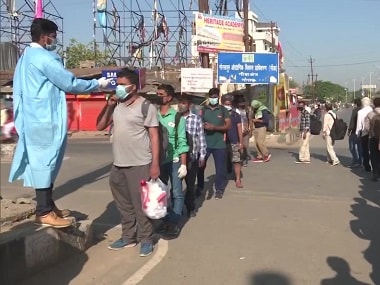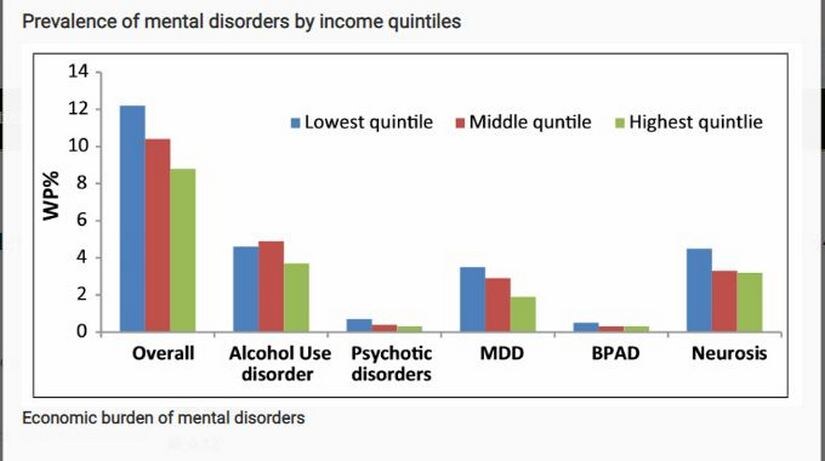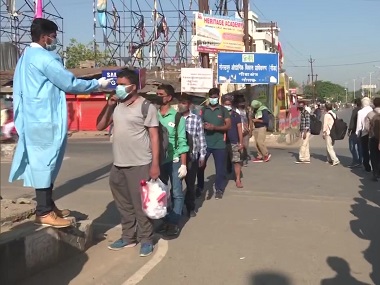A 26-year-old studying in Ranchi, killed herself because she was unable to go back to her parents’ home during COVID-19 lockdown. A 25-year-old, pursuing a master’s programme in Ireland, managed to rush back home, just before international flights shut down, because she felt lonely and depressed. She still hung herself two months later at her family home in Mumbai. A 56-year-old hung himself in Andhra Pradesh’s Chittoor district near his mother’s grave because he thought he was coronavirus positive and was afraid he would infect his three children and wife. [caption id=“attachment_8203671” align=“alignleft” width=“380”]  Representational image. ANI[/caption] A 50-year-old COVID-19 patient undergoing treatment in Bengaluru’s Victoria Hospital killed himself after another woman admitted in the same ward succumbed to the disease. His doctors said he was responding well to the treatment despite an underlying renal condition. A rickshaw driver in Nagpur set himself ablaze because he was unable to manage his alcohol withdrawal symptoms. Reeling off these facts makes no sense - the victims were all of different age group, from different strata of society and from different geographical locations - only that all these lives could have been saved if circumstances were different. Just as India is struggling to arrest the spread of a global pandemic and reduce the mortality rate, a wave of completely preventable deaths have hit the nation. A look at user search behaviour on internet reveals that the search for the term ‘suicide’ peaked right after lockdown was announced in India. It spiked again when it was extended for the third time.
Suicide is reportedly the second leading cause of non-coronavirus deaths in India during the lockdown, according to the data compiled by journalist Rachel Chitra. A similar study by a group of researchers found that 168 of the 326 non-COVID-19 deaths till 9 May (51 percent) were suicides. These figures are nowhere close to the actual impact of the crisis as these are simply a compilation of deaths reported in the media.
Mental health experts, working in the frontlines, think that many such deaths are going unreported and may never make it to an official tally. They also warn that a second wave of suicides will hit once the true economic impact of the punishing lockdown seeps into people’s jobs and lives after the lockdown is lifted.
The economic burden of lockdown costs lives
Loss of jobs, pay cuts, and financial distress are some of the obvious offenders and direct byproducts of the lockdown that has made a huge section of our population vulnerable to the point of contemplating self-harm. Hemangi Vyawahare, a Bandra-based therapist in Mumbai says the real threat of suicide deaths is still snowballing and the real picture will emerge once people settle in and face the real impact on their income and job security. A report in The Conversation, quotes data based on surveys conducted in the western world to support her hunch. Studies in 26 European countries over four decades suggest that increases in unemployment of more than 3 percent are associated with increases in suicides by 4.45 percent. A similar relationship was found in Australia during the global financial crisis.
In India, where the employment situation and per capita income is relatively worse, deaths caused by despair can outweigh the ones caused by the pandemic. A Mumbai-based think tank said that the country’s unemployment rate to 27.11 percent for the week ended 3 May, up from the under 7 percent level before the start of the pandemic in mid-March.
In these situation, India’s poorest are also its worst hit in the face of the pandemic. The national mental health survey last released in 2016 also reveals that people from lowest income groups were the most vulnerable when it comes to mental disorders. Now in a pandemic, when they are also the economically worst-hit, most media-reported suicide deaths were of migrant labourers resorting to self-harm out of financial desperation. [caption id=“attachment_8364691” align=“alignnone” width=“825”]  National Mental Health Survey, released in 2016, found that people from low income groups were more likely to be hit by mental health issues. NMHS[/caption] Shernaz Doctor a therapist with Samaritans Mumbai — a suicide prevention and therapy group that provides free services to the needy — echoes the same sentiment. Shernaz found that people from lower income group were most vulnerable as their anxiety attacks were driven by real-life survival crisis. They were also the least likely to seek help. She explains that Samaritans sustains on donations and offers free counselling to those in need, but that is hardly the end of the problem. Even before the lockdown, access and cost barriers along with social stigma associated to mental illnesses, kept it out of reach for the poor. Now with the entire country under lockdown, the marginalised section has added stress and reduced access to therapists and medication. Online or tele-therapy is a privilege reserved for the upper and middle class Indians; none of the technology platforms that have become our respite from lockdown are designed taking into account the less literate, disabled or the poor people. “When people are struggling with job losses and financial stress, treatment for mental health does not even feature on their priority list. We try to offer free services to as many as possible, but reach and capacity of NGOs like ours is very limited. Also, our efforts to provide therapy may not always bear fruits because a lot of people live in one-room shanties or small flats with a large family. They do not have the privacy or the privilege to undergo therapy from their homes,” Shernaz says. She says that some people don’t even have smartphones, but need medication which are more often than not classified as Scheduled H and H1 drugs, that cannot be purchased over the counter without a prescription. “We ask such patients to go to the nearest medical stores, then we talk to the chemist, Whatsapp them the prescription details and facilitate the purchase,” Shernaz says.
Elderly, children, young adults are among vulnerable groups: Doctors
Mental health experts, stepping up to deal with the sudden crisis, report a plethora of underlying factors that have also led to a spike in distress calls and suicidal tendencies. And the harsh lockdown has further hampered people’s capacity to reach out for help. One of the most vulnerable groups are people already suffering from psychological disorders. Shreya Agarwal, a Pune-based clinical psychologist offering pro-bono services to those in need, said she has seen that past trauma is resurfacing for a lot of people because of the increased stress and negativity in these times. Shernaz Doctor said that her clients, especially those dealing with depression, have been distressed because whatever semblance of a routine they had built with so much effort is now shattered. “In my experience, while those suffering from anxiety have found it better to manage their symptoms because they are not required to go out and socialise, this is a bad time for those dealing with depression,” she says. Elderly are another group left to fend for themselves. “Suicide is never about death. It’s about not wanting the life you have,” Shernaz says. And chronic depression, unwillingness to live and clinical depression are common problems among the elderly even in normal times. For the geriatric population, the lockdown presents a complex paradox. While social distancing and isolation are the only way to protect them from the disease, but at the same time it triggers feeling of alienation and insecurity. With the lockdown and the pandemic, these feelings are now heightened. Their routine is destroyed, and they fear that they will die alone due to the lockdown, says Agarwal. In Vyawahare’s experience, the coping mechanism for such alienation is either witnessed in form of rash behaviour and low self worth, or they simply slip into depression. Vyawahare labels the former as an expression of self-harm, and warns against more serious sucidal tendencies due to the latter. “We forget that old people are not as tech savvy. For them, adjusting to this new life order is like learning a new life skill. You cannot expect them to order their grocery online or medication through an app. They simply do not have the will to carry on or adapt,” she says. Vyawahare says lockdown has given rise to strains in ties, domestic violence, verbal and physical abuse at home. “Family squabbles, clashes and strains in ties have been flaring up because people are suddenly home bound. They have to face those differences and issues which had been swept under the carpet. And when a household is stressed, children are the worst affected,” she says, “That is when we see reactions like irritability, acting out, tantrums. Kids are young to understand the reality of these times, especially when we are not providing them answers in the right way, but the parents’ stress rubs off on them.” For teenagers and young adults, the lockdown has wiped out their safe-space. “Youngsters who already have strained ties with their parents and family are suddenly constrained in a constricted space with them. All they are left with is the washroom,” Vyawahare said.
Can’t see your therapist due to lockdown?
Dr A Jagadish, consultant psychiatrist at Abhaya Hospital in Bangalore, said that in the early days of lockdown a psychotic patient tried to kill himself because he couldn’t access his medication. “A psychotic patient attempted suicide because they could not access the medication due to the lockdown. The sudden withdrawal of medicines caused resumption of their symptoms, including auditory hallucinations. The patient heard voices which were nudging them to resort to self-harm.” While Jagadish’s patient survived, many others were simply unprepared for the trauma and stress these times have unleashed. Yael Ajgarni, a resident of suburban Mumbai lost a friend to chronic depression on 27 April, less than two weeks after the lockdown period was extended. The 25-year-old girl (name withheld) was diagnosed with clinical depression while studying abroad, and her friends had begged her to come back home to be among loved ones. But soon after her return, the situation in Maharashtra worsened and OPDs in all prominent hospitals were shut off; private therapy clinics too became out of reach. Yael believes that although options like online therapy could have been possible, the lockdown made it more difficult to seek help.
Getting help for mental health comes with taboo, disinterest or disinclination from the patient and the lack of seriousness and awareness among family and the loved ones. Lockdown simply added another layer of inertia to the whole process.
“As she was depressed, may be she needed that extra push and perseverance from her friends and family to go seek help. I and her other friends tried our best over phone calls but we couldn’t physically be there to take her to a psychiatrist due to the lockdown. We informed one of her family members that she was predisposed to suicidal thoughts and ideation, but families rarely do understand the severity and seriousness of these things. They perhaps thought that she could manage her stress on her own, or they failed to comprehend the seriousness; we would never know. All I know is she could have been saved.”


)

)
)
)
)
)
)
)
)



